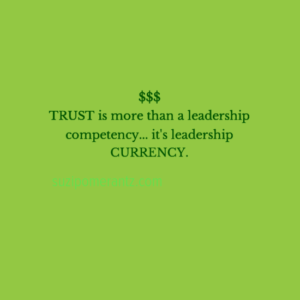
 Trust. You know what it means. You know when you trust someone. You know when you don’t trust someone.
Trust. You know what it means. You know when you trust someone. You know when you don’t trust someone.
But do you know how to build trust? Do you know when to build trust? Do you know how to leverage trust? Do you know how to use trust to cultivate strategic relationships of influence?
Who is blocking you from accomplishing your leadership mandate? In what ways are you blocking your own progress?
First, identify what you believe to be true about trust. How do you define it? Is it given or earned? What happens once it’s betrayed or lost?
Next, identify who you need to cultivate relationships with in order to understand how decisions are made in your organization, how information flows, and who holds the keys to getting things done. Who influences the influencers? Once you have your list of names, put a T next to the ones you trust, and a D next to the ones you don’t trust. If your relationship is neutral, mark it with an N.
Start with the D group. The goal here is to get them to trust you. Yes, even if you don’t trust them, you can still build relationships in a way that gets them to trust you. This could be important for your biggest objectives being realized. What will that take? What do they each care most about?
The next task at hand is to cultivate your relationships with the T group so that you can seek their support or air cover in all that you’re working to accomplish. They will help you navigate the internal politics and they can open doors for you with people they know and trust who have influence. They can also help you to get the D group to trust you.
Finally, you can work on the N group. By strengthening those relationships you could ultimately determine whether you can trust them or need to get them to trust you.
Trust is more than a leadership competency, it’s leadership currency.
Therefore it is always important to be prioritizing and tracking your success at keeping, cultivating, and expanding your strategic relationships of influence by paying attention to trust and how you can use it in your leadership.
(For more on trust, visit here for more posts)

